“Travelers” or “Travellers”
Travelers and travellers are both English terms.
Travelers is predominantly used in 🇺🇸 American (US) English ( en-US ) while travellers is predominantly used in 🇬🇧 British English (used in UK/AU/NZ) ( en-GB ).
In terms of actual appearance and usage , here's a breakdown by country, with usage level out of 100 (if available) 👇:
- In the United States , there is a preference for " travelers " over "travellers" (93 to 7).
- In the United Kingdom , there is a 78 to 22 preference for " travellers " over "travelers".
- In India , there is a 72 to 28 preference for " travellers " over "travelers".
- In the Philippines , there is a preference for " travelers " over "travellers" (55 to 45).
- In Canada , there is no clear preference between "travelers" and "travellers", with usage levels of 50 vs. 50.
- In Australia , there is a 76 to 24 preference for " travellers " over "travelers".
- In Liberia , there is not enough data to determine a preference between "travelers" and "travellers".
- In Ireland , there is a 79 to 21 preference for " travellers " over "travelers".
- In New Zealand , there is a 72 to 28 preference for " travellers " over "travelers".
- In Jamaica , there is a 66 to 34 preference for " travellers " over "travelers".
- In Trinidad & Tobago , there is a preference for " travelers " over "travellers" (52 to 48).
- In Guyana , there is not enough data to determine a preference between "travelers" and "travellers".
Below, we provide some examples of when to use travelers or travellers with sample sentences.
📈 See Trends
Looking for a tool that handles this for you wherever you write?

Examples of “travellers”
- … the visually impaired enable all travellers to reach the trains without
- … only small shelters for mainline travellers ) and the goods shed an …
- … Stories Under the Sun: 2: Travellers ' Tales, (with David Myers), Central …
- … the reports of merchants and travellers , including Muhammad ibn Yusuf al-Warraq …
- … Ifan was studied by early travellers and antiquarians, and rapidly became …
- … only as a hostel for travellers but also as an important …
- Dauphin Kings defeated Brandon Travellers 4-games-to-2
- … is likely that more overland travellers take this river route than …
- Services for travellers
- Marty Ehrlich: Traveller's Tale
(Examples are Wikipedia snippets under the CC ShareAlike 3.0 license.)
Too Much to Remember?
AmeriAgency Insurance
Protecting your tomorrow, today.
Travelers vs. Travellers: The Great Spelling Debate Explained
Travelers vs. Travellers – Are you a travel enthusiast who’s always confused about how to spell the word “traveler”? Do you find yourself constantly switching between “traveler” and “traveller”? Well, you’re not alone! The great spelling debate of “traveler” versus “traveller” has been ongoing for decades, and it seems like there’s no clear winner. While both spellings are technically correct, there are some subtle differences in their usage and meaning. As a copywriter and digital marketer, I have come across this spelling conundrum numerous times, and I understand the importance of getting it right. In this article, I will explain the origins of the two spellings, their differences in usage and meaning, and provide some tips on how to choose the right spelling for your content. So, whether you’re a seasoned travel writer or just starting out, read on to unravel the mystery of the great spelling debate of “traveler” versus “traveller.” Are you looking for Travelers Insurance company? Get a Travelers Insurance quote here?
Travelers or Travellers – The History Behind the Two Spellings
The word “traveler” has been used in the English language since the 14th century. It comes from the Old French word “travaillour,” which means “one who works hard.” The word “traveller,” on the other hand, is a more recent addition to the English language and was first recorded in the 1590s. It comes from the Middle English word “travaillen,” which means “to toil or labor.”
Travelers vs. Travellers – the two spellings have coexisted in the English language for centuries, with each spelling being used interchangeably in different regions of the world. However, the spelling “traveller” is more commonly used in British English, while “traveler” is more commonly used in American English.
Regional Preferences – Where Each Spelling is More Commonly Used
As mentioned earlier, “traveler” and “traveller” are used interchangeably in many regions of the world. However, there are some regions where one spelling is more commonly used than the other.
In American English, “traveler” is the preferred spelling. This is the case in Canada as well. In Australia and New Zealand, “traveller” is the preferred spelling. In the United Kingdom and other parts of the Commonwealth, “traveller” is the more commonly used spelling.
It’s worth noting that even within these regions, there can be variations in spelling depending on the context. For example, in British English, “traveler” is used when referring to modes of transportation, such as “train traveler” or “air traveler.” Click here for the dictionary.
American English vs. British English – How They Differ in Spelling
The differences between American and British English spellings are well-documented, and the spelling of “travelers” vs. “travellers” is no exception. As mentioned earlier, “traveler” is the preferred spelling in American English, while “traveller” is the preferred spelling in British English.
In addition to travelers vs. travellers, there are many other words that are spelled differently in American and British English. For example, “color” is spelled “colour” in British English, and “center” is spelled “centre.” These differences in spelling can sometimes cause confusion, especially when writing for an international audience.
The Impact of Technology on Spelling
The rise of technology and the internet has had a significant impact on the way we spell words. With the advent of spell-checkers and autocorrect, it’s easier than ever to ensure that your spelling is correct.
However, these tools are not foolproof and can sometimes lead to errors. For example, if you’re using a spell-checker that is set to American English, it may automatically change “traveller” to “traveler” without you even realizing it.
It’s always important to double-check your spelling, especially when writing for an international audience. You don’t want to inadvertently use the wrong spelling and alienate your readers.
Travelers or Travellers – Which Spelling Should You Use?
So, which spelling should you use? The answer depends on your audience. If you’re writing for an American audience, “traveler” is the preferred spelling. If you’re writing for a British audience, “traveller” is the preferred spelling.
If you’re writing for an international audience, it’s best to choose one spelling and stick with it throughout your content. This will help to avoid confusion and ensure that your content is consistent.
How to Handle the Spelling When Writing for an International Audience
When writing for an international audience, it’s essential to be mindful of the spelling differences between American and British English. Here are some tips to help you handle the spelling when writing for an international audience:
— Select one spelling and stick with it throughout your content.
— If you’re unsure which spelling to use, do some research on your target audience to determine which spelling is more commonly used.
— If you’re using a spell-checker, make sure it’s set to the correct language.
— Double-check your spelling before publishing your content.
Other Spelling Debates in English Language
The spelling of “traveler” versus “traveller” is just one example of the many spelling debates in the English language. Here are some other examples:
— “Program” versus “programme”
— “Theater” versus “theatre”
— “Color” versus “colour”
— “Center” versus “centre”
These spelling differences can be confusing, but it’s important to remember that both spellings are technically correct. The key is to choose one spelling and stick with it throughout your content.
Travelers or Travellers Fun Facts and Trivia
— The word “traveler” is the preferred spelling in the United States, but it’s also used in British English when referring to modes of transportation, such as “train traveler” or “air traveler.”
— The word “traveller” is the preferred spelling in the United Kingdom and other parts of the Commonwealth, but it’s also used in American English, especially in formal writing.
— The spelling of “traveler” versus “traveller” is just one example of the many spelling differences between American and British English.
— The rise of technology and the internet has made it easier than ever to ensure that your spelling is correct, but it’s significant to double-check your spelling, especially when writing for an international audience.
Conclusion – The Verdict on Which Spelling to Use
So, which spelling should you use – “traveler” or “traveller”? The answer depends on your audience. If you’re writing for an American audience, “traveler” is the preferred spelling. If you’re writing for a British audience, “traveller” is the preferred spelling.
Ultimately, both spellings are technically correct, and it’s up to you to select which one to use. The key is to be consistent and to double-check your spelling before publishing your content. By following these tips, you can navigate the great spelling debate of “traveler” versus “traveller” with confidence and ease. Click here for a Travelers Insurance review.
- Pearl Hunting
- Hidden Code
- World Watch
- Pioneer Clips
- Pioneer On View
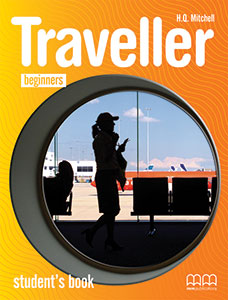
Traveller is an exciting seven-level course for teenage and young adult learners, that takes them from Beginner to Advanced level. It follows the requirements of the Common European Framework of Reference, the modular approach and is organised into 8 topic-based modules.

This is a course that has been trusted and loved by thousands of teachers and students around the world. Its proven methodology combines solid grammar and vocabulary practice and a thorough preparation in all four essential skills in language learning. Traveller is well-known for helping students build their receptive language skills while systematically developing their productive ones.
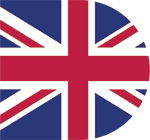
Traveller comes in two editions, the American English (AmE) edition and the British English (BrE) edition .
Select the edition you prefer in order to see the levels, the components and table of contents.

- Motivating and contemporary topics with multicultural and cross-curricular information
- Lively dialogues presenting real spoken English
- An integrated approach to the development of the four skills
- Special emphasis on vocabulary building
- Grammar presented and practised in context
- Systematic development of reading and listening skills and subskills
- A variety of communicative tasks
- Step-by-step approach to writing
- Activities encouraging critical thinking and personal response
- Practical tips helping students to become autonomous learners
- A round-up section in each module providing regular revision and consolidation
- A grammar reference section
- Culture / Cross-Curricular pages with web links
- accompanying material
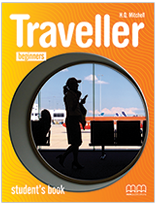
intermediate B1
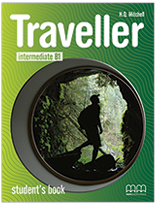
- Traveller beginners
- Traveller elementary
- Traveller pre-intermediate
- Traveller intermediate
- Traveller B1+
- Traveller level B2
- Traveller level C1
- Traveller (British English)
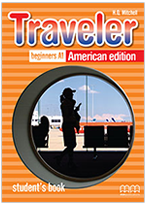
- Traveler beginners
- Traveler elementary
- Traveler pre-intermediate
- Traveler intermediate
- Traveler B1+
- Traveler (American English)
access our marketing pack
Our website only uses necessary cookies
Necessary Cookies allow the efficient operation of our website by enabling basic functions (such as navigation and access to various pages). Our website cannot function properly without these cookies.
For more details click here for our Cookies Policy
I accept the use of cookies

Travelling or Traveling: What’s the Difference?
Home » Travelling or Traveling: What’s the Difference?
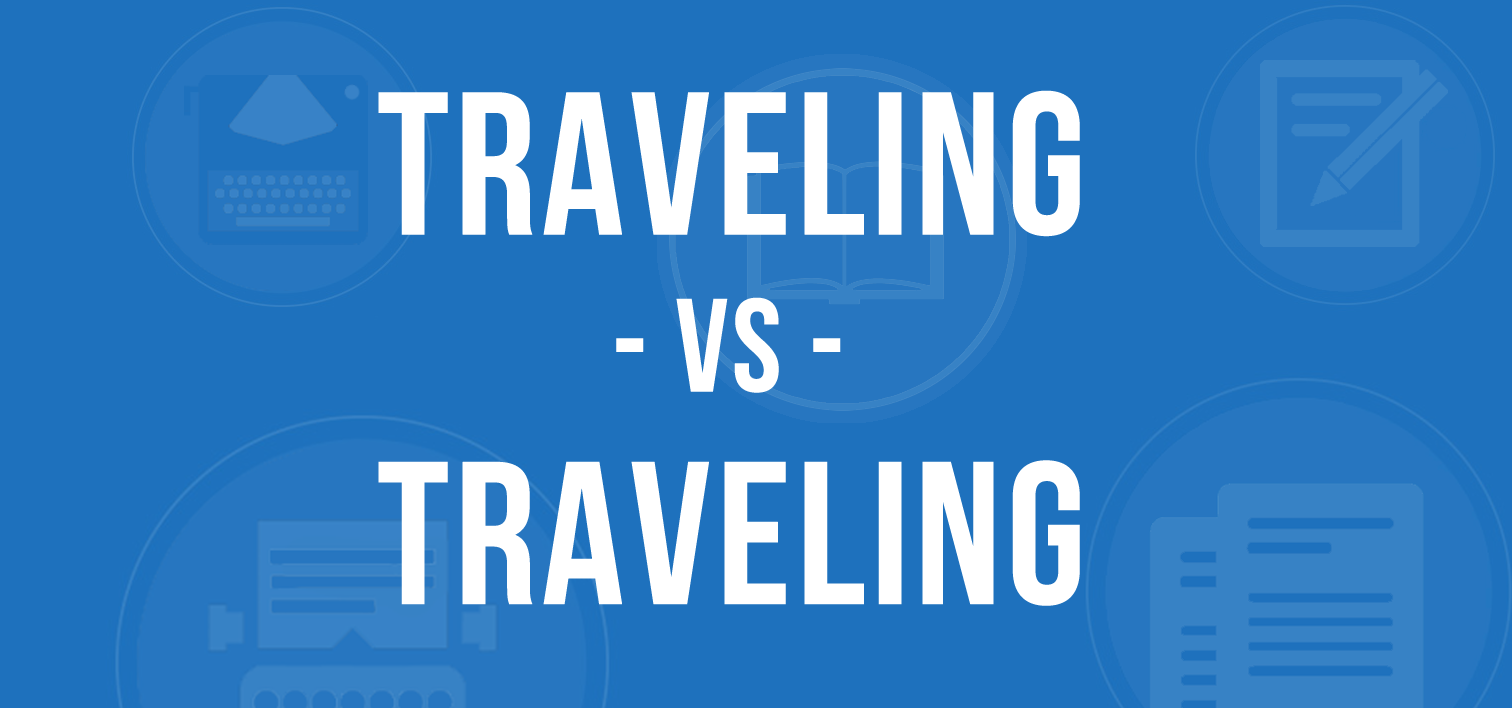
Are you taking a trip anytime soon? If so, where will you be traveling? Or is it travelling? How exactly do you spell this word?
The two words traveling and travelling can cause some confusion for those writers not exactly sure when to use which one. Are they just variations of the same word? Do they have different meanings? Do they function differently in a sentence?
In today’s post, I want to address all of these questions so you will never again wonder or second-guess yourself, “Is it travelling or traveling?”
The Difference Between Travelling and Traveling
Travelling and traveling are both verbs, obviously. To travel is to go from one place to another, as on a trip or journey. For example,

- When the traveling pub is taken off a trailer and put together in a lot near Milwaukee and California avenues, it will boast 400 feet of bar space. – Chicago Sun Times
- They travelled 5,000 miles from Myanmar to place a plaque in Seagrim’s native village of Whissonsett in eastern England. – Washington Post
- Under that analysis, completion of the mobility plan would result in about 35 million miles per day being traveled on L.A. surface streets in 2035. – L.A. Times
You’re probably still thinking, “Okay, I still don’t know how to use these words.”
The difference between traveling vs. travelling isn’t much of a difference at all, really.
In fact, the difference between them is entirely dialectal. There is no demonstrable difference of sense or function, meaning both words can be used interchangeably.
When to Use Travelling
Even though the only thing separating travelling and traveling is a dialectical difference, it is still important to keep your audience in mind when picking which word to use and when.
Travelling (with two Ls) is the preferred spelling in British English and is used much more frequently than is traveling . The graph below shows the use of travelling vs. traveling (as a percentage of all words used) in British English books, journals, and magazines from 1800 to 2008.
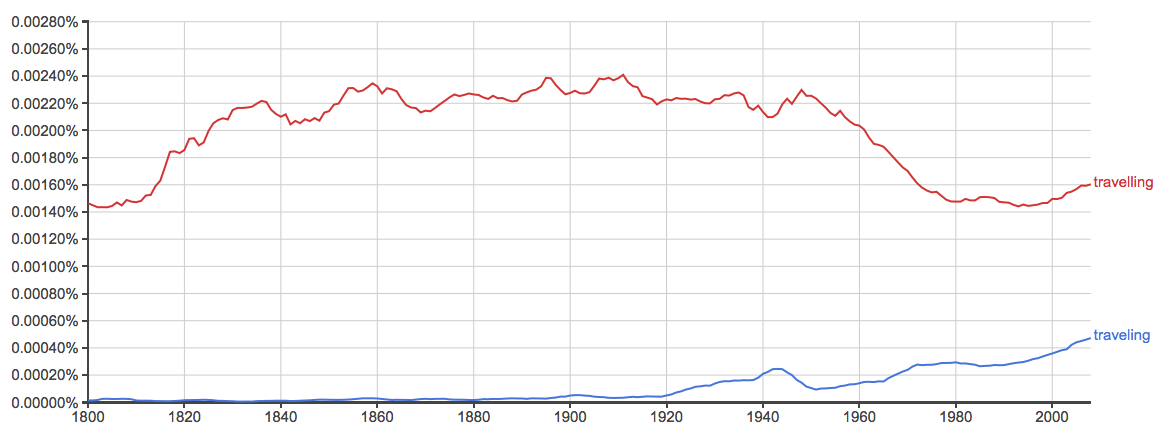
As you can see, travelling (with two Ls) clearly dominates in British English, being used at a rate of about 4:1.
Now, if we look at the same two words over the same time period but limit our search to American print sources, the results completely flip.
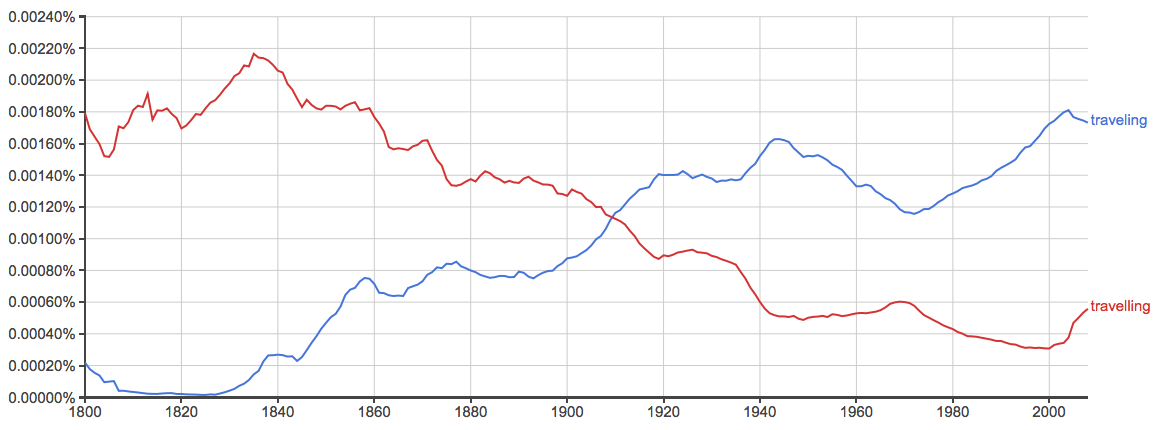
There’s actually a bigger gap between traveling and travelling in American English than there is in British English.
When to Use Traveling
As indicated in the above graph, traveled (with one L) is the preferred spelling in American English.
I’ve discussed the reason for the popularity of many shortened spellings in American English in other posts ( cancelled/canceled comes to mind ), but the basic reason stems back to Noah Webster himself.
He is usually credited with the shortening of many American spellings because in his original 1898 dictionary, he sought to simplify many British spellings he saw as unnecessary. This is where the British-American divide over words like color/colour came from.
Anyway, the point is, if you are writing to an American audience, traveling (with one L) is your best choice.
Remember the Difference – Traveling or Travelling?
One simple way to keep track of these two words is that the shorter spelling is American. If you can keep in mind that, generally speaking, British English favors (favours) the longer spelling of words, you will be able to remember the difference between these words.
It is also worthwhile to note that all of the distinctions in this post apply equally to travelled vs. traveled, traveled vs. travelled, traveller vs. traveler, traveler vs. traveller, etc.
Summary – Traveling vs. Travelling
Is it traveling or travelling? That depends on where you are writing and who is your audience.
- Travelling is the preferred spelling in British English.
- Traveling is the preferred spelling in American English.
Whether you’re talking about travelled or traveled or traveller or traveler, these same preferences still apply.

The Vegan Travelers
taste the world.

Travelers or Travellers?
Since a few people pointed out to us that “travelers” should be written with double “l”, here is a brief explanation.
Ironically, all of these people so far were German speaking and not native English speakers. Therefore it can probably be assumed that this error is due to the strong UK-style English lessons at German schools. Yes, “travellers” actually is written with two “l” in British spelling – in the American however not. And yes, we adapt ourselves to American English: We write “color”, “theater” and “cookie” – not “colour”, “theatre” and “biscuit”.
Nevertheless, of course we have thought about that when choosing our name . Naturally, we want to feel comfortable with the English that we write, and it’s quite logical that we prefer the linguistic variation, which we also use in spoken conversation. And we just don’t speak with a British accent, not to mention all the strange words. (Seriously, who actually calls a “zucchini” “ courgette “? 😛 Although we have to admit that “lorry” sounds a lot cuter than “truck” and “telly” as “TV” or “ice lolly” as “popsicle” and “loo” instead of “toilet”, but we’re simply not talking to babies. And why would you call an “airplane” “aeroplane” when you say “air” and not “aero”?)
Almost as important to us, however, is to reach as many people as possible. That’s why we looked at the Google Trends: While “traveler” and “traveller” provide a neck-and-neck race, when it comes to “travelers” vs. “travellers” and “traveling” vs. “travelling” the American version is clearly ahead.
We also get significantly more results for a Google Germany search for “traveler” than for “traveller”.

As mentioned above, we just feel more comfortable with the American spelling. And even though we sometimes use British vocabulary on our blog – whether it’s for more diversity, by mistake (after all, we’ve learned British English at school, too), or because we simply find it more appropriate, e.g. in case of the ice cream van in Bruges (in American English it would actually be an “ice cream truck”, which we rather attribute to the type of vehicle to be found there and we considered the ice cream cart photographed by us more like a “van” than a “truck”) – we find that at least the spelling should be uniform (in our case, American). And therefore we believe that our name spelling should also be consistent with the rest of the content.
And that’s why we are not “The Vegan Travellers”, but “The Vegan Travelers”. 😉
You might also be interested in:

Leave a Reply Cancel reply
Your email address will not be published. Required fields are marked *
By using this form, I agree to the storage and processing of my data (name/email/website/IP address) through this website. This website uses cookies to give me the best possible experience. Further information can be found in the privacy policy .
I have read and accepted the Privacy Policy *
Grammar Palette

Traveler or Traveller: Which Spelling is Right?
People often argue about the correct way to spell words, and one common debate is between ‘traveler’ and ‘traveller.’ Both spellings are okay, but which one is more right? Let’s look at the differences and when to use each.
Table of Contents
American Way: ‘Traveler’
In America, we usually write ‘traveler.’ It’s simpler with just one ‘l.’ This way of spelling came about in the 1800s to make writing easier. So, if you’re in the United States, ‘traveler’ is the way to go.
British Style: ‘Traveller’
Across the pond in the United Kingdom, they prefer ‘traveller’ with two ‘l’s. The British like to keep things traditional, holding onto how words were spelled in the past.
Where and How to Use
The choice between ‘traveler’ and ‘traveller’ isn’t only about where you are. It also depends on what you’re reading. American books and websites use ‘traveler,’ while British ones use ‘traveller.’ Both are right in their own way.
You will like: Center vs Centre: Decoding the Spelling Difference
Language Changings
Words change over time, and that’s cool. ‘Traveler’ and ‘Traveller’ show how English can be different but still right. Instead of thinking of them as mistakes, see them as part of the language’s rich variety.
Deciding between ‘traveler’ and ‘traveller’ is mostly about where you are and what you’re reading. Neither way is wrong – it’s about keeping things consistent. Whether you like the American ‘traveler’ or the British ‘traveller,’ just stick to one. Language is all about talking to each other, and having different spellings just makes it more interesting.
Related Posts

Agreeance vs Agreement: Which One to Use?

Connector or Connecter: What’s the Correct Spelling?

Is it Pallette or Palette? Choosing the Correct Spelling!

Totalling or Totaling: Which Spelling to Use?

Flounder vs Founder: Which One to Use?

Axle or Axel: What’s the Difference?
Leave a comment cancel reply.
Your email address will not be published. Required fields are marked *
Save my name, email, and website in this browser for the next time I comment.

Enhance your language skills with Grammar Palette! Join our newsletter for easy grammar tips, joyful learning, and improved communication. Subscribe now!

The Plagiarism Checker Online For Your Academic Work
Start Plagiarism Check
Editing & Proofreading for Your Research Paper
Get it proofread now
Online Printing & Binding with Free Express Delivery
Configure binding now
- Academic essay overview
- The writing process
- Structuring academic essays
- Types of academic essays
- Academic writing overview
- Sentence structure
- Academic writing process
- Improving your academic writing
- Titles and headings
- APA style overview
- APA citation & referencing
- APA structure & sections
- Citation & referencing
- Structure and sections
- APA examples overview
- Commonly used citations
- Other examples
- British English vs. American English
- Chicago style overview
- Chicago citation & referencing
- Chicago structure & sections
- Chicago style examples
- Citing sources overview
- Citation format
- Citation examples
- College essay overview
- Application
- How to write a college essay
- Types of college essays
- Commonly confused words
- Definitions
- Dissertation overview
- Dissertation structure & sections
- Dissertation writing process
- Graduate school overview
- Application & admission
- Study abroad
- Master degree
- Harvard referencing overview
- Language rules overview
- Grammatical rules & structures
- Parts of speech
- Punctuation
- Methodology overview
- Analyzing data
- Experiments
- Observations
- Inductive vs. Deductive
- Qualitative vs. Quantitative
- Types of validity
- Types of reliability
- Sampling methods
- Theories & Concepts
- Types of research studies
- Types of variables
- MLA style overview
- MLA examples
- MLA citation & referencing
- MLA structure & sections
- Plagiarism overview
- Plagiarism checker
- Types of plagiarism
- Printing production overview
- Research bias overview
- Types of research bias
- Example sections
- Types of research papers
- Research process overview
- Problem statement
- Research proposal
- Research topic
- Statistics overview
- Levels of measurment
- Frequency distribution
- Measures of central tendency
- Measures of variability
- Hypothesis testing
- Parameters & test statistics
- Types of distributions
- Correlation
- Effect size
- Hypothesis testing assumptions
- Types of ANOVAs
- Types of chi-square
- Statistical data
- Statistical models
- Spelling mistakes
- Tips overview
- Academic writing tips
- Dissertation tips
- Sources tips
- Working with sources overview
- Evaluating sources
- Finding sources
- Including sources
- Types of sources
Your Step to Success
Plagiarism Check within 10min
Printing & Binding with 3D Live Preview
Travelling or Traveling – British vs. American English
How do you like this article cancel reply.
Save my name, email, and website in this browser for the next time I comment.
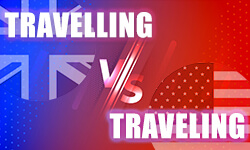
Consistency is crucial in academic writing , particularly when crafting a research paper , dissertation , or academic essay . This involves maintaining a consistent vocabulary, grammar, spelling, and punctuation to ensure a cohesive, clear, and easy-to-understand flow throughout the paper. Many students have difficulties differentiating between British English vs. American English such as whether to use “travelling” or “traveling”. Learn how to distinguish these two in this article.
Inhaltsverzeichnis
- 1 “Travelling” or “traveling”
- 2 “Travelling” or “traveling” in the past tense
- 3 “Travelling” or “traveling” as a noun
“Travelling” or “traveling”
“Travelling” and “traveling” both define the past tense of the verb “to travel.” To travel means to move or journey from one place to another, typically over a distance. It involves going to a different location, either domestically or internationally, for various purposes, such as leisure, business, exploration, or personal reasons. Traveling often involves transportation, such as by car, train, plane, or boat, to reach the desired destination. The spelling may differ depending on whether you’re using British or American English. In British English, it’s always spelled with a double “l”. However, in American English, both spellings are acceptable, though using a single “l” is more prevalent.

British English

American English
travelling (not recommended)
In general, British English tends to use more doubled consonants in certain verb forms, such as adding an extra “l” in words like “travel.” This is because British English obeys the rule of doubling the consonant when adding suffixes like “-ing” or “-ed” to certain verbs. American English, on the other hand, often maintains the base spelling of the verb.
Examples of using “travelling” and “traveling”
The following examples will exemplify the difference in spelling of the word “travelling/traveling” in British and American English.

- I enjoy travelling to new countries.
- She is currently travelling through Europe.
- Our family loves travelling during summer vacations.

- I enjoy traveling /traveling to new countries.
- She is currently traveling /traveling through Europe.
- Our family loves traveling /traveling during summer vacations.
“Travelling” or “traveling” in the past tense
When using the verb “travel” in the past tense, the exact spelling applies to British English vs. American English, as with the “-ing” form. British English is written with a double “l” and in American English, both ways are possible but a single “l” is more common.
- British English: “Travelled”
- American English: “Traveled” or “travelled”
The following examples will explain the usage of the word “travelled/traveled” in both languages.
- Last year, I travelled to Italy.
- She travelled throughout Europe during her gap year.
- We travelled by train to visit our relatives.

- Last year, I traveled /travelled to Italy.
- She traveled /travelled throughout Europe during her gap year.
- We traveled /travelled by train to visit our relatives.


“Travelling” or “traveling” as a noun
The word “travel” refers to the noun form of the verb “to travel.” The word “travel” is spelled the same way in both British and American English, with only one “l”.
The following examples will show you the usage of the noun “travel”.

- I love exploring places through travel.
- Business travel can be exciting.
- She has a passion for adventure travel .

How do you spell “travelling”?
The correct spelling differs between American English and British English:
- The correct spelling in American English is: “traveling” with one “l”.
- The correct spelling in British English is: “travelling” with a double “l”.
How do you spell “travelling” in British English?
In British English, the correct spelling is “travelling” .
How do you spell “traveling” in American English?
In American English, the correct spellings are “traveling” and “travelling”, but the spelling with one “l” is far more common, while the one with the double “l” is not recommended .
How do you spell “travelled”?
The correct spelling in American English is “traveled” with one “l” and in British English “travelled” with a double “l”. While it is possible to use the British spelling for American English, it is not recommended .
How do you spell “travel”?
The standard spelling in British and American English is “travel”. A version with a double “l” is not possible .
We use cookies on our website. Some of them are essential, while others help us to improve this website and your experience.
- External Media
Individual Privacy Preferences
Cookie Details Privacy Policy Imprint
Here you will find an overview of all cookies used. You can give your consent to whole categories or display further information and select certain cookies.
Accept all Save
Essential cookies enable basic functions and are necessary for the proper function of the website.
Show Cookie Information Hide Cookie Information
Statistics cookies collect information anonymously. This information helps us to understand how our visitors use our website.
Content from video platforms and social media platforms is blocked by default. If External Media cookies are accepted, access to those contents no longer requires manual consent.
Privacy Policy Imprint
Is it ‘traveling’ or ‘travelling’?
What to Know When it comes to spelling the forms of the verb travel , traveled and traveling are more common in the U.S., and travelled and travelling are dominant everywhere else.
Spelling is typically clear-cut in modern English: forty unfailingly betrays four ; the sweet treat after dinner is spelled dessert , not desert .
But some words have two forms that appear often enough in edited text to make it clear that something else is going on. And so it is with forms of the verb travel : traveled and travelled , and traveling and travelling .
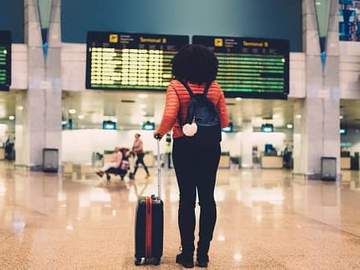
It might have a different spelling wherever you're going.
One or Two L 's?
If you look at where the single l forms originate and where the double l forms originate a pattern emerges: in the United States, traveled and traveling predominate, and everywhere else travelled and travelling are preferred.
The reason mostly comes down to one man we at Merriam-Webster hold especially dear: Noah Webster. Our lexicographical father (brothers George and Charles Merriam bought the rights to Noah Webster’s 1841 dictionary after Webster died) was a great believer in spelling reform and wanted English spelling to make more sense—and if the English of his homeland had more logic to it than its British parent, so much the better. He decided that travel needed only one l in its past and present participle forms.
Webster’s logic is the reason behind the spelling of canceled and cancelled as well: in the U.S., they have just one l , but elsewhere two l ’s are the norm.
American English Words that Use 2 L 's
Webster didn’t think all double l ’s needed to be reduced to one, however: in cases in which the accent, or emphasis, is on the syllable with the l , two l ’s are preserved: expelled and expelling ; controlled and controlling ; patrolled and patrolling .
Word of the Day
See Definitions and Examples »
Get Word of the Day daily email!
Games & Quizzes

Commonly Confused
'canceled' or 'cancelled', is it 'home in' or 'hone in', the difference between 'race' and 'ethnicity', homophones, homographs, and homonyms, on 'biweekly' and 'bimonthly', grammar & usage, primary and caucus: what is the difference, words commonly mispronounced, merriam-webster’s great big list of words you love to hate, more commonly misspelled words, commonly misspelled words, 12 words for signs of spring, 12 more bird names that sound like insults (and sometimes are), 13 unusually long english words, the words of the week - apr. 26, 9 superb owl words.

Subscription Offers
Give a Gift

Britain's Gypsy Travellers: A People on the Outside
Despite the popularity of shows like My Big Fat Gypsy Wedding , Britain’s Gypsy Travellers still face longstanding prejudice, warns Becky Taylor.
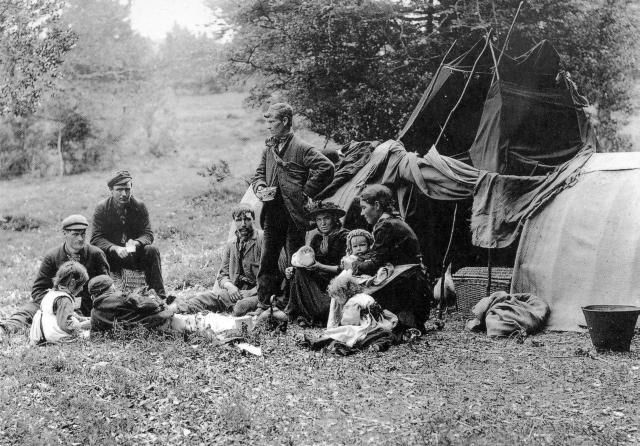
Two months later and Channel 4’s My Big Fat Gypsy Wedding is generating waves on television. While sympathetic and giving a voice to Gypsy Travellers, it nevertheless presents an exoticised image of their lives: the horse-drawn wagons, extravagant dresses and flamboyant wedding arrangements seem to encapsulate how they remain the ‘other’ of British society. As the opening voiceover put it: ‘For hundreds of years the Gypsy way of life was one of ancient traditions and simple tastes. Then their world collided with the 21st century. With unprecedented access to the UK’s most secretive community … this series will take you to the very heart of Gypsy life.’ If contemporary images of Gypsy Travellers seem to be polarised between vilification and the exotic, can the same be said for historical depictions of one of Britain’s oldest minority groups?
While the details remain contested, it is now broadly agreed that Europe’s Roma and Gypsy populations can trace their origins back to an Indian diaspora in the tenth century, with ‘Egyptians’ arriving in Britain by the early 16th century. Despite persecution, Gypsies established themselves, finding niches in both town and countryside, sometimes being protected by landowners who found them useful as a supply of casual labour, for entertainment and sometimes simply by the inconsistent application of the law. Their treatment reflected majority society’s deep ambivalence about the presence of Gypsies and a nomadic way of life. On the one hand it symbolised freedom from the responsibilities and duties associated with settled lifestyles – typified in folk songs such as ‘The Raggle-taggle Gypsy’; on the other it provoked an almost visceral hatred, a suspicion that Gypsies could evade the law and the codes of behaviour that bound settled society to a place and a parish.
Rather than being polar opposites, however, we might understand these stereotypes as two sides of a coin – as the product of a tendency to view Gypsy lives through the lens of the preoccupations and assumptions of mainstream society – rather than being grounded in reality. Whether articulated positively or negatively these stereotypes stem from the assumption that Gypsies were irredeemably separate from the rest of the population.
Yet, contrary to these stereotypes, Gypsies and Travellers traded with, worked and lived alongside the rest of the population: an analysis of the traditional songs sung by Gypsies and Travellers, for example, shows significant overlap with those current in wider society, suggesting a high degree of interaction between the communities, particularly in casual agricultural and seasonal labour. Arthur Harding’s classic account of the East End underworld at the beginning of the 20th century, compiled by the historian Raphael Samuel, revealed in passing how Gypsy Travellers were part of the everyday fabric of poor urban life. David Mayall’s work on the 19th century, my own on the 20th and that of the Dutch scholars Lucassen, Willems and Cottars for the European context all confirm the ways in which the lives of Gypsy Travellers and settled populations were intimately interconnected and often how the lines between them were in fact blurred. Gypsies lived in peri-urban encampments or even cheap lodging in cities over winter alongside working-class populations, making and selling goods, moving in regular circuits across the countryside in the spring and summer, picking up seasonal work, hawking and attending fairs. Far from being ‘a separate people’, their economic survival in fact depended on close engagement with the wider population.
The stereotypes became increasingly entrenched over the course of the 19th century as Britain’s population became increasingly urbanised and the countryside became the repository for the working out of anxieties related to the rapidly changing social and physical landscape. Alongside phenomena like the folk song revival, the cult of the ‘outdoors’ and the early caravanning movements there emerged a movement of amateur ‘gentlemen scholars’, self-styled ‘gypsiologists’, who developed an interest in recording the origins, language and customs of Britain’s Gypsy Travellers. Focused around the activities of the Gypsy Lore Society (GLS), established in 1889, they became preoccupied with the foreign ancestry of British Gypsies and with developing theories about their ‘pure bred’ nature, which often tied blood lines to Romany language use and ‘proper’ nomadic living. The Gypsy caravan, which had only made its appearance in the 1830s as a result of the improving road system, became central to settled society’s image of ‘the Gypsy’, in part through paintings, such as those of the prominent GLS member Augustus John. Fed by an outpouring of writings on the subject from the 1880s, popular imagination saw Gypsies as a people who turned up out of the blue, camped on commons or byways in their bow-topped caravan, grazed horses, sold pegs, perhaps ‘tinkering’, ‘here today and gone tomorrow’. Just as the producers of My Big Fat Gypsy Wedding promised ‘unprecedented access’, so too did numerous gypsiologists spend a summer living with a group of Gypsy Travellers gaining an insight into ‘the secret people’ before writing a book about their experiences. Crucially, such Gypsies were always portrayed as ‘pure blooded’ or ‘true’ Romanies, largely untouched by modern, industrialised Britain. As one gypsiologist, Arthur Symons, wrote in the early 20th century:
Why ... are we setting ourselves the impossible task of spoiling the Gypsies? ... they stand for the will of freedom, for friendship with nature, for the open air, for change and the sight of many lands; for all of us that are in protest against progress ... The Gypsies represent nature before civilisation ... the last romance left in the world.
Crucially, for these stereotypes to find resonance in modern Britain, gypsiologists constructed a theory around the decline in the racial purity of Gypsies as they increasingly mixed and married with ‘degenerate’ members of the settled population. They developed a racial hierarchy which placed ‘pure-blooded’ Gypsies, who were believed to speak the best Romany, at the top; followed by ‘didikais’, half-breeds, or ‘pikies’ – groups with varying proportions of Gypsy blood depending on which source one reads; and ‘mumpers’, who were vagrants with no Romany ancestry, at the bottom. As David Mayall observed:
To confuse the ‘true’ Gypsy with those of diluted blood was presented as a grave error that led to much injustice being directed towards the clean-living Romany. The latter, declining in numbers as the century progressed, were superior in manners, morals and occupations to their degenerate and impoverished ‘mumply-brothers’. These half-breeds were said to have inherited all the vices of the Romany and the Gaujo [non-Gypsy] but none of their virtues.
For gypsiologists anxious to discover a Golden Age and a pure Gypsy culture this outlook allowed them to pursue their pet theories, with any contradictory findings dismissed as the result of cultural pollution and miscegenation. This enabled gypsiologists to distance themselves from the squalid, urban Traveller encampments that existed around all Britain’s major cities and any other elements that impinged on romantic notions of a rural Gypsy idyll.
Just as the impetus to romanticise Gypsies gained ground in the later 19th century, so too did negative stereotypes, as a growing body of opinion saw Travellers as being out of step with modern society. Along with longstanding beliefs about the lazy and lawless nature of Gypsies came newer concerns about their unsanitary habits, which were seen as anachronistic in a nation that increasingly set store by its housing and sanitary legislation. Added to this were commonly expressed sentiments that they were escaping from paying taxes and consequently evaded the responsibilities that came with modern living. Such views gained ground particularly in times of social difficulty. During the Second World War Gypsies were a common scapegoat for the press, which depicted them as shirkers and deserters, able to escape conscription through their nomadism and evading rationing through poaching and foraging. As the South Wales Evening Post put it: ‘Many people wonder how Gypsies get off with food rationing. It is understood, however, that hedgehogs are not rationed.’
Lacking a political voice or a representative body Gypsy Travellers responded to this entrenchment of stereotypes not by challenging them but by working within their parameters. Thomas Acton first pointed to the practice of claiming to have ‘pure Gypsy blood’ as a means of asserting an individual’s right to travel, while scapegoating other travelling communities: ‘I’m a real Gypsy/Traveller/Romani, and we don’t do that, only the (ethnic category name with pejorative overtones)’. He observed that the effect of this ‘transference of blame’ was to divert the hostility of the accuser away from that particular individual to an absent outsider group which both parties could agree was fundamentally incapable of maintaining a nomadic lifestyle. While in the short run this was ‘an attractive strategy for the individual Traveller’, it was not without its shortcomings, as it served to confirm racialised definitions of
Travellers, equating a right to travel with spurious definitions of blood purity. It was not until the 1960s and the formation of the Gypsy Council that Gypsy Travellers as a community found a collective voice, one which tried to assert that all had a right to travel and that nomadism did have a place in modern Britain. While it scored some early successes, notably in the 1968 Caravan Sites Act, its influence both within and outside the travelling community has declined over recent years and has failed to dislodge the enduring stereotypes surrounding Gypsies.
Travellers have modernised alongside the rest of society and are not a ‘secret people’ living in the manner of their great grandparents. Crucially this change in their lifestyle has removed what settled society understands as the markers of ‘true’ Gypsies: bow-topped caravans, horses and so on. These images of Gypsies have become the rod with which their back is consistently beaten: failing to conform to romantic expectations, the stereotypes most often deployed in the popular press and by politicians are the negative ones relating to anti-social behaviour and an inability to adapt to the standards of ‘normal’ society.
This leads us back to the people of Dale Farm and the stars of My Big Fat Gypsy Wedding . We may wonder at the dresses and tut over wedding venues cancelling bookings when they find they are to host a Traveller wedding, but this translates into neither an understanding of the place of Gypsy Travellers in British society nor positive political action. Living in an ex-scrapyard by the side of a busy dual carriageway, the Dale Farm homes are immaculate trailers from which furniture-selling businesses are run. Vulnerable through their lack of romantic visual appeal and unable to attract political representation, Travellers are facing the active prejudice not just of Basildon Council but of councils across the country, which decide not only that Travellers may not stay on their own land, but are also determined that there is no place for a Traveller community within its district. It is surely time for us to move beyond the stereotypes which have served Gypsy Travellers, settled society and historical analysis so ill for centuries and instead have the strength to embrace the diversity and richness represented by Britain’s nomadic communities. Seeing 80 families being put onto the highway will be Britain’s shame as much as Sarkozy’s expulsion of Roma from France.
Becky Taylor is author of A Minority and the State: Travellers in Britain in the 20th Century (Manchester University Press, 2008).
Popular articles
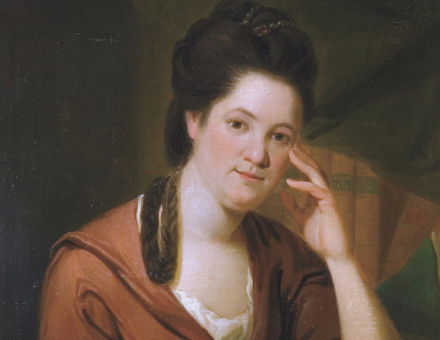
‘Bluestockings’ by Susannah Gibson review

Why Were the Jews Persecuted?
- Cambridge Dictionary +Plus
Meaning of traveller in English
Your browser doesn't support HTML5 audio
- The modern traveller can go where he likes .
- She is a seasoned traveller.
- Out in the desert the traveller is a welcome guest .
- Travellers can break their journey in Singapore if they wish .
- daily passenger
- day-tripper
- grief tourist
- super-commuter
You can also find related words, phrases, and synonyms in the topics:
traveller | Business English
Examples of traveller, translations of traveller.
Get a quick, free translation!

Word of the Day
veterinary surgeon
formal for vet

Dead ringers and peas in pods (Talking about similarities, Part 2)

Learn more with +Plus
- Recent and Recommended {{#preferredDictionaries}} {{name}} {{/preferredDictionaries}}
- Definitions Clear explanations of natural written and spoken English English Learner’s Dictionary Essential British English Essential American English
- Grammar and thesaurus Usage explanations of natural written and spoken English Grammar Thesaurus
- Pronunciation British and American pronunciations with audio English Pronunciation
- English–Chinese (Simplified) Chinese (Simplified)–English
- English–Chinese (Traditional) Chinese (Traditional)–English
- English–Dutch Dutch–English
- English–French French–English
- English–German German–English
- English–Indonesian Indonesian–English
- English–Italian Italian–English
- English–Japanese Japanese–English
- English–Norwegian Norwegian–English
- English–Polish Polish–English
- English–Portuguese Portuguese–English
- English–Spanish Spanish–English
- English–Swedish Swedish–English
- Dictionary +Plus Word Lists
- English Noun
- Business Noun
- Translations
- All translations
Add traveller to one of your lists below, or create a new one.
{{message}}
Something went wrong.
There was a problem sending your report.
- Teaching secondary
- Lesson plans
- Secondary lesson plans - Intermediate B1
Round-the-world travellers
This lesson offers a variety of activities based on British round-the-world travellers; a cyclist, a running granny and a teenage sailor.

Students will firstly review country names, and then there is an activity to pre-teach vocabulary for a jigsaw reading task, where students will explain their texts to each other. There follows a role play in which students play the part of a traveller or a journalist, and this is followed by a task where students compare ideas on advice to world travellers. Finally there is a more open discussion task about young people, travel and world records.
Aims: • To learn vocabulary related to travel and adventure • To develop reading skills • To practise speaking skills Age group: 12- adult
Level: B1 / B2
Time: 60 minutes
Materials: Around-the-world travellers student worksheet, jigsaw reading texts, and lesson plan
Copyright – Please read
All the materials on these pages are free and available for you to download and copy for educational use only. You may not redistribute, sell or place these materials on any other web site without written permission from the BBC and British Council. If you have any questions about the use of these materials, please e-mail [email protected]
Research and insight
Browse fascinating case studies, research papers, publications and books by researchers and ELT experts from around the world.
See our publications, research and insight

Live-English.net
Learn English Online with real teachers
40 Basic Vocabulary Words and Common Phrases for Travel in English
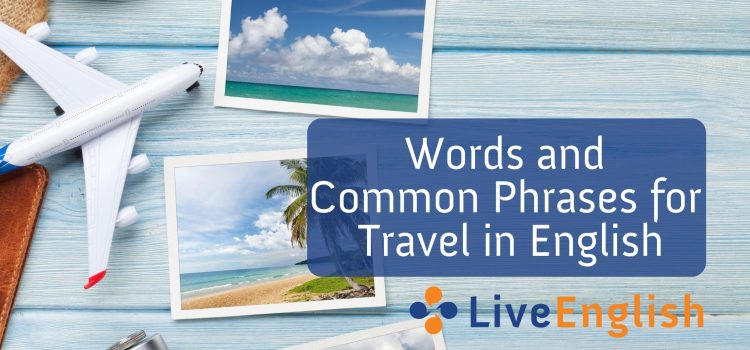
Embarking on a journey to a foreign country can be both exciting and a bit daunting, especially when language barriers come into play. But fear not, we’ve got you covered! This page is dedicated to all the globetrotters out there who are keen on enhancing their English language skills specifically for travel.
We’ve curated a list of 40 essential English words and phrases that will prove to be your best companions on your travels.
Whether you’re a seasoned traveler or planning your first overseas trip, mastering these words and phrases will not only boost your confidence but also enrich your travel experiences. So, let’s dive in and start preparing for your next adventure with our comprehensive travel vocabulary guide. Happy learning and safe travels!
40 essential English words and phrases for travel
- Passport – “Don’t forget to bring your passport to the airport.”
- Luggage – “Please make sure your luggage is not left unattended.”
- Reservation – “I have a reservation under the name Smith.”
- Itinerary – “Our itinerary includes stops in Rome, Paris, and London.”
- Destination – “Our final destination is Sydney.”
- Accommodation – “I’ve booked accommodation for three nights in the city center.”
- Sightseeing – “We’re going sightseeing in the old town tomorrow.”
- Currency – “What’s the local currency in Japan?”
- Boarding Pass – “Please have your boarding pass and identification ready.”
- Departure – “Our departure time is 6:00 PM.”
- Arrival – “Our estimated arrival time is 8:00 PM.”
- Customs – “You’ll need to declare any items at customs.”
- Visa – “Do I need a visa to travel to the United States?”
- Tourist – “As a tourist, I love exploring new places.”
- Landmark – “The Eiffel Tower is a famous landmark in Paris.”
- Guidebook – “I bought a guidebook to learn more about the city’s history.”
- Souvenir – “I bought a souvenir from each city we visited.”
- Jet Lag – “I’m feeling a bit of jet lag after the long flight.”
- Travel Agency – “The travel agency arranged all of our accommodations.”
- Backpack – “I prefer to travel with a backpack instead of a suitcase.”
- Could you help me, please? – When you need assistance.
- How much does this cost? – When you want to know the price of something.
- Where is the nearest…? – When you’re looking for something specific, like a bathroom or a subway station.
- I would like to book… – When you want to make a reservation.
- Do you speak English? – When you need to find someone who speaks English.
- I’m lost. Can you help me? – When you need directions.
- Can I have the menu, please? – When you’re at a restaurant and want to see the menu.
- I’m allergic to… – When you need to inform someone of your allergies.
- Can I have the bill, please? – When you’re ready to pay at a restaurant.
- What time does it open/close? – When you want to know the operating hours of a place.
- Can I have a ticket to…, please? – When you’re buying a ticket.
- Where can I catch the bus/train? – When you need to find the bus or train station.
- Is it far from here? – When you want to know the distance to a place.
- Can you recommend a good…? – When you’re looking for recommendations.
- Do you accept credit cards? – When you want to know if you can pay with a credit card.
- What’s the Wi-Fi password? – When you need to connect to the internet.
- I’d like to go to… – When you’re telling a taxi driver your destination.
- Is there a pharmacy nearby? – When you need to find a pharmacy.
- Can I try this on? – When you’re shopping for clothes and want to try something on.
- Could you take a picture of us, please? – When you want someone to take a photo of you and your group.
Wrapping Up Our English Travel Vocabulary Journey
And there you have it! We’ve journeyed through 40 essential English words and phrases that will help make your travels smoother and more enjoyable. Remember, language is a powerful tool that can open doors to understanding new cultures, making new friends, and creating unforgettable experiences.
Don’t worry if you can’t memorize all the words and phrases at once. The beauty of language learning is that it’s a continuous process. Keep practicing, and soon these words will become second nature to you.
But why stop at 40? If you’re eager to expand your travel vocabulary even further, we have an exciting offer for you. Follow us on Instagram and send us a direct message to get your hands on our comprehensive eBook (write “Travel eBook”), which features 200 essential English words and phrases for travel, plus 2 special bonuses!
We hope this guide will be a valuable resource for your travel adventures. Whether you’re exploring bustling cities, tranquil countryside, or exotic beaches, these phrases will help you navigate your way with confidence.
Thank you for joining us on this linguistic journey. We wish you all the best in your English learning and your future travels. Remember, every journey begins with a single step, or in this case, a single word. Happy travels and happy learning!
>> Learn more English vocabulary
Privacy Overview
Search form
- A2 listening
Travelling abroad

Listen to the five airport announcements and do the exercises to practise and improve your listening skills.
Instructions
Do the preparation exercise before you listen. Then do the other exercises to check your understanding.
Preparation
Do this exercise before you listen.
Good morning. This is an announcement for all passengers travelling on the 9:25 flight TOM1223 to Rome. This flight is delayed by two hours because of bad weather.
Would all passengers travelling to Tokyo on flight FR3421 please have your boarding passes and passports ready for boarding. Flight FR3421 now boarding at gate 21.
This is the final boarding call for passengers Gemma and Ryan Grey flying to Athens on flight EZ9753. Your flight is ready to leave. Please go to gate 14 immediately. The doors of the plane will close in five minutes. Final boarding call for passengers Gemma and Ryan Grey.
This is an announcement for passengers travelling to Amsterdam on flight KL1050. Will all passengers with express boarding tickets and passengers travelling with young children please go to gate 6 for boarding. That's all passengers with express boarding tickets and passengers travelling with young children go to gate 6 for boarding. Thank you.
Good evening, ladies and gentlemen. We have landed at JFK airport in New York where the local time is 18:30 and the temperature is 76º. We hope you have enjoyed your flight with American Airlines this evening and wish you a very safe journey to your final destination.
Check your understanding: matching
Check your understanding: typing, worksheets and downloads.
Tell us about the last time you took a flight somewhere!

Sign up to our newsletter for LearnEnglish Teens
We will process your data to send you our newsletter and updates based on your consent. You can unsubscribe at any time by clicking the "unsubscribe" link at the bottom of every email. Read our privacy policy for more information.

The 9 Easiest Languages for English Speakers to Learn
Posted: March 15, 2024 | Last updated: March 15, 2024
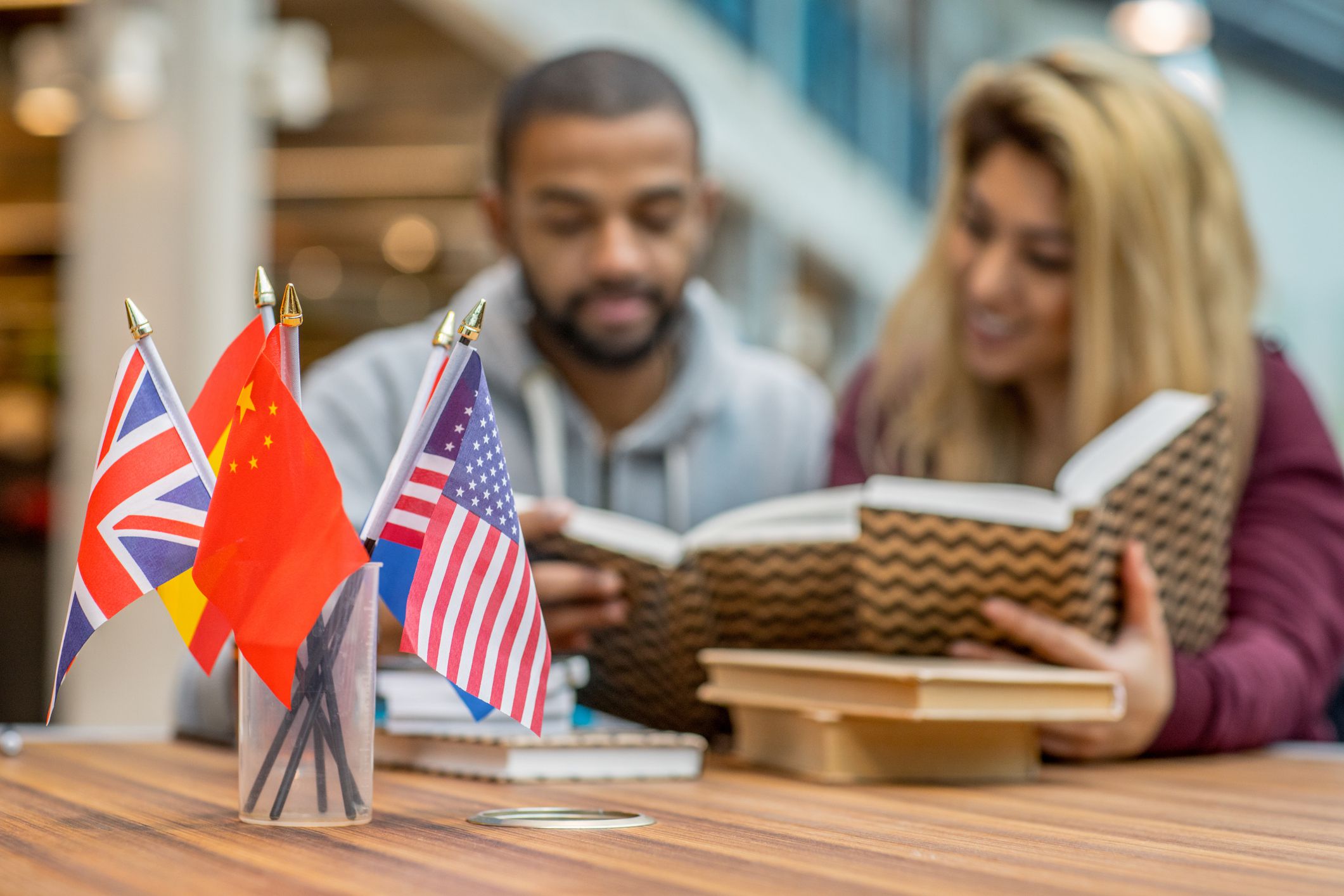
9 Easiest Languages For English Speakers To Learn
So you’ve decided to learn a language. (Good choice! We approve.) Your next task, if you’re up for it: Choosing among many options. Should you go for a more widely spoken language like Spanish or Mandarin, a politically relevant one like Russian, or one you can use on your next vacation? These are all valid motivations, but here’s another thought: What about the easiest languages to learn?
You’re busy. We all are. Why not tackle a language that will be relatively easy to learn? With the help of Babbel’s team of language-learning experts, we’ve determined the easiest language to learn for English speakers. Well, let’s just say we’ve narrowed down the list to 9 of them. Hopefully, this will help you narrow down your options, so you can start learning right away.

Are Some Language Easier To Learn Than Others?
Let’s start by dispelling the idea that there are some languages that are objectively easier than others. Each language is full and complicated, and if you start from scratch (like a baby would), there’s no difference between Arabic, Latin, English, Mandarin or anything else. When you’re learning a second language, however, some will be easier than others. The United States Foreign Service Institute even has an estimate as to how long it will take for someone to learn it (if they’re learning every day with an instructor). There are a few factors that play into a language being “easy.”
First, and most important, is similarity. Choosing a language that has a decent amount in common with the one you speak give you a natural leg up. If you speak English, then learning another languages that uses the Latin alphabet is automatically going to be a bit easier than learning one that has an entirely different writing system.
Languages within the same language family as English, or that share a lot of vocabulary and grammar, will also be easier.
Another factor that can make a language easier is accessibility. Even if a language is similar to English, that doesn’t matter if it’s very hard to find resources and practice partners. While this varies from person to person, it will also be easier to learn a language if you live near others who speak it.
There are, of course, many other reasons to learn a language than its ease. You might even prefer the challenge that comes with a harder language. If the idea of an easier language is appealing to you, however, that’s fair. Without further ado, here’s our list.

1. Norwegian
Foreign Service Institute Estimate: 24 weeks (600 hours)
This may come as a surprise, but we have ranked Norwegian as the easiest language to learn for English speakers. Norwegian is a member of the Germanic family of languages — just like English! This means the languages share quite a bit of vocabulary, such as the seasons vinter and sommer (we’ll let you figure out those translations).
Another selling point for Norwegian: the grammar is pretty straightforward, with only one form of each verb per tense. And the word order closely mimics English. For example, “Can you help me?” translates to Kan du hjelpe meg? — the words are in the same order in both languages, so mastering sentence structure is a breeze!
Finally, you’ll have a lot more leeway with pronunciation when learning Norwegian. That’s because there are a vast array of different accents in Norway and, therefore, more than one “correct way” to pronounce words. Sound appealing? Lace up your snow boots and give Norwegian a try!
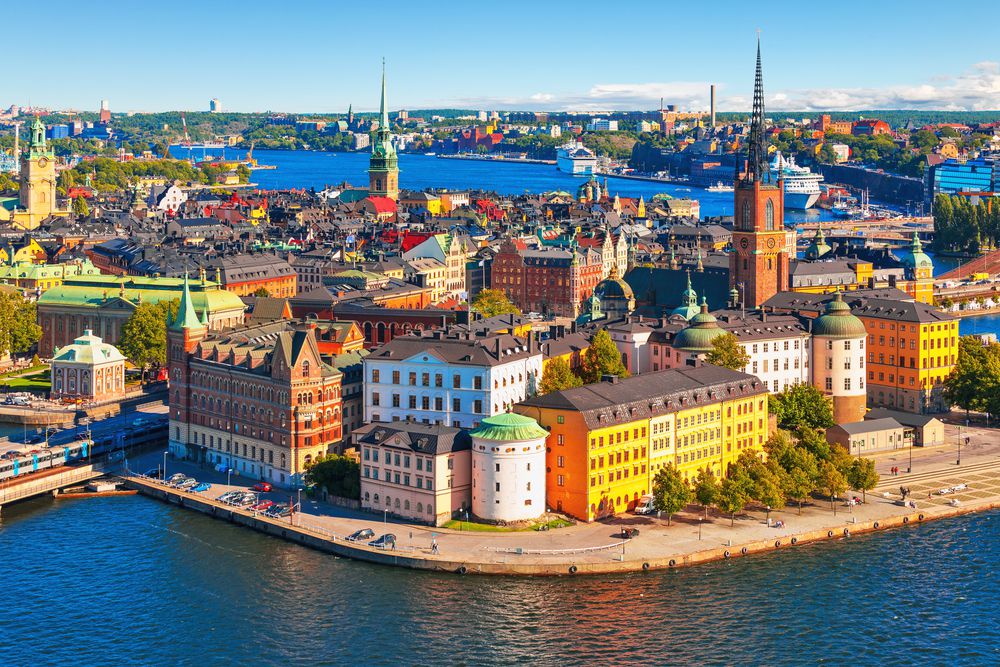
Our second easiest language to learn also comes from Scandinavia and the Germanic family of languages. One reason Swedish is one of the easiest languages for English speakers to learn is the large number of cognates the two languages share (cognates are words in different languages that stem from the same ancestral language and look and/or sound very similar to one another). For instance, “grass” is gräs in Swedish — a clear cognate.
Like Norwegian, Swedish also has relatively simple grammar rules and similar word order to English. And thanks to the obsession with IKEA, Swedish has something else working in its favor: exposure. English speakers around the world have been exposed to a number of Swedish words while simply shopping for furniture (and chowing down on some meatballs, I presume). The popular, minimalistic Lack tables are named after the Swedish word for “varnish.” And the Stockholm rugs, of course, get their name from Sweden’s capital. Furniture lovers, perhaps Swedish is the language for you.

This pick should come as no surprise. Spanish has always been a go-to language for English speakers to learn due to its practicality and wide reach. Well, it’s also one of the easiest languages to learn for English speakers.
Spanish is one of the Romance languages, which derive from Latin — as do many English words, so the name of the game here is cognates, cognates, cognates. Correcto means “correct,” delicioso is “delicious,” and pizza is “pizza,” to name a few.
Spanish pronunciation is also fairly straightforward. It’s a phonetic language — for the most part, its words are pronounced the way they’re spelled. But grammar haters beware: Spanish does have a number of different verb tenses and exceptions to grammar rules which can get confusing. However, the tenses largely align with ones we use in English, so they’re not as difficult to learn as you may think.
But perhaps the biggest pro to choosing to learn Spanish is its prevalence in our everyday lives. According to recent statistics , Spanish is the second most-spoken language in the world, with over 485 million native speakers. You’ve probably heard Spanish spoken on TV, on the radio, and even by members of your community. It’s everywhere, so you already have a leg up on learning it!
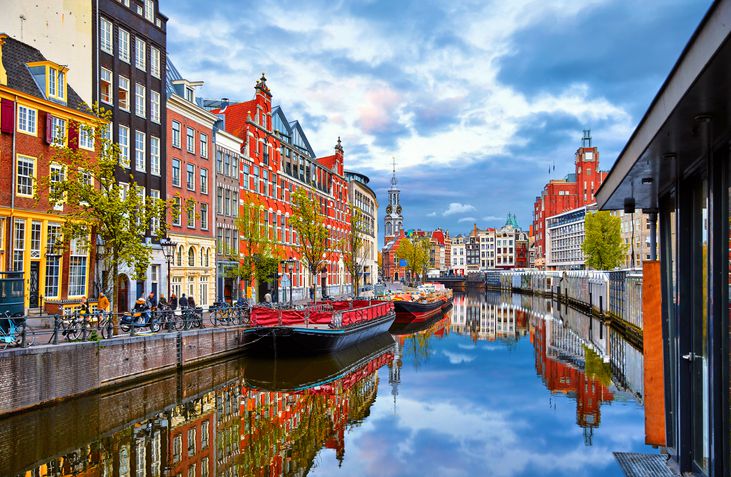
Dutch is another Germanic language on our list. It’s spoken by the majority of citizens of the Netherlands, as well as a large portion of Belgium’s population. It’s the third most-spoken Germanic language, after German and English, which makes sense — due to shared vocabulary, Dutch sounds like a combination of German and English.
A really interesting characteristic of Dutch is that many words are spelled exactly the same as they are in English, more so than in almost any other language. However, use caution, because they’re often pronounced differently. For instance, the word “rat” has the same spelling and meaning in both languages, but in Dutch it’s pronounced like the English word “rot.” Also, keep an eye out for false cognates, like the Dutch word wet , which actually means “law.” If you stay vigilant, Dutch could still be the language for you.
Germanic languages nab three of the top four spots on this list, but English’s other cousins, German and Danish, are absent — and for good reason. German didn’t make the cut because although it shares thousands of cognates with English, absolutely no one would describe its grammar as “easy.” And while written Danish looks a lot like Norwegian and Swedish, the pronunciation can be too intimidating for casual learners. If you’re up for the challenge, check out the hardest languages for English speakers to learn .
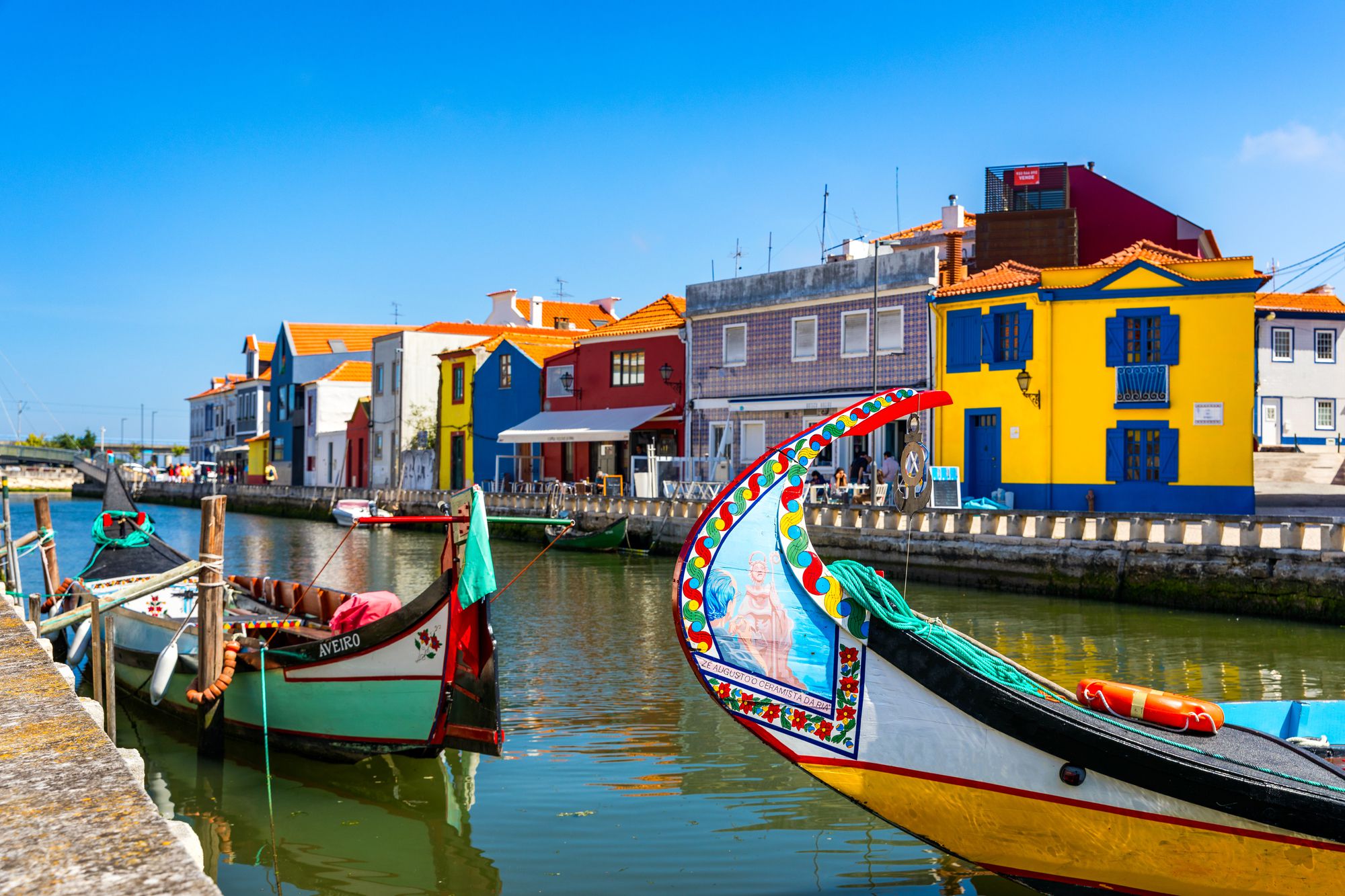
5. Portuguese
The fifth easiest language to learn on our list is Portuguese, a member of the Romance language family that’s spoken in both Portugal and Brazil .
Like Spanish, this translates to a large number of shared vocabulary words, which always makes picking it up easier. But beware of false cognates. You might be really excited about getting Portuguese pasta , only to be handed a “folder.”
Portuguese (particularly Brazilian Portuguese) is another language that gives learners the advantage of exposure. Brazilian food, drinks, music and films have been making frequent appearances in global pop culture, giving students of Portuguese plenty of opportunities to enhance their learning.

6. Indonesian
Foreign Service Institute Estimate: 36 weeks (900 hours)
This selection may also come as a surprise, but Indonesian has several qualities that make it a logical choice for English speakers.
For starters, Indonesian — spoken natively by nearly 23 million people — is one of the few Asian languages that uses the Latin alphabet. Many Asian languages are incredibly difficult for English speakers to master due to the unfamiliar characters in their writing systems, but not Indonesian.
It’s also a phonetic language, made up of words that are pronounced exactly the way they’re spelled. Now, Indonesian grammatical structures are very different from those in English, but don’t let that deter you! Its lack of rules make learning grammar a lot easier. There are no verb conjugations (you read that correctly!), no plurals (simply repeat the word twice), and no grammatical genders. If you’re not a fan of grammar rules, Indonesian could be a match made in heaven!

Next up is another Romance language. Though not as widely spoken as Spanish or Portuguese, Italian still has more than 63 million native speakers. Its Latin roots allow for a sizable chunk of cognates English speakers will recognize, such as futuro (“future”) and lotteria (“lottery”), two things we all wish we could controllare (“control”).
Perhaps the best part of choosing Italian is the possibility to learn with food! Italian cuisine has become a staple of many Western countries, bringing a number of Italian words into our regular vocabularies. Penne all’arrabbiata translates to “angry pasta” (presumably because it’s spicy!), and farfalle (the pasta shaped like bow ties) actually means “butterflies.” Doesn’t learning Italian sound delizioso ?
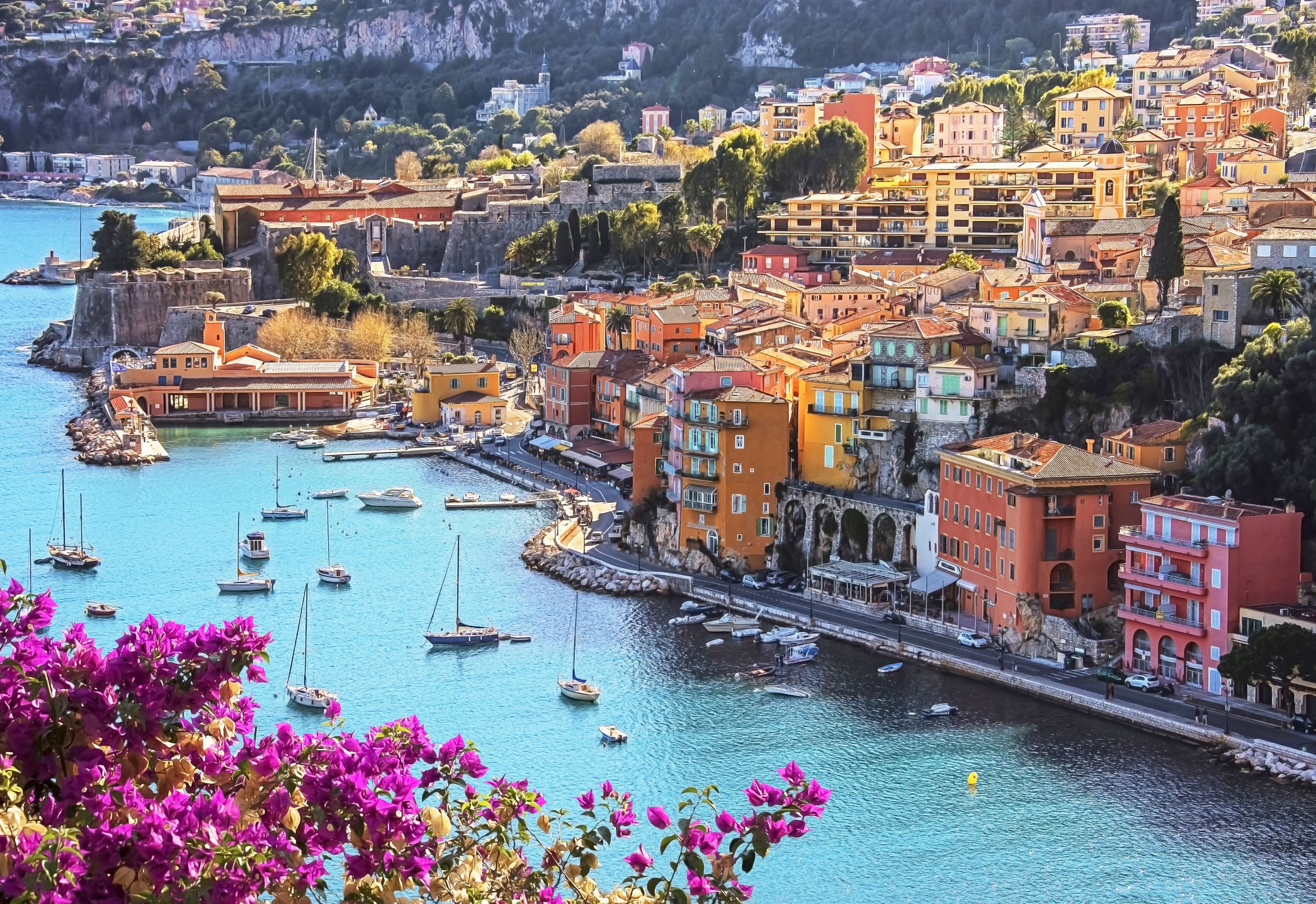
Foreign Service Institute Estimate: 30 weeks (750 hours)
There’s one more major Romance language on our list, and this one is often a fan favorite. Although it’s not as easy to learn as some of its language cousins, French (and/or its various dialects and creoles) is spoken by nearly 300 million people in many different parts of the world (France, Canada, Belgium and Madagascar — to name only a few).
As with the other Romance languages, the biggest benefit to choosing to learn French is the large amount of shared vocabulary. But this isn’t solely due to its linguistic roots.
During the lengthy history of wars and conquests between France and England, key language parts were passed from one country to the other. This mostly came in the form of French vocabulary added to the English language, such as avant-garde and à la carte, although the word-sharing went from English to French as well (e.g. week-end).
French pronunciation is a bit tricky, at first, but we often hear French accents in pop culture, making them easier to replicate than you may think.

The final language on our list is perhaps the “least easiest language to learn” of the easiest languages. Swahili is widely used across eastern and southeastern Africa, including in Kenya, Uganda and Tanzania, among other countries, but usually as a lingua franca — a common language adopted among native speakers of different languages.
Swahili words often sound just like they’re spelled, and the pronunciation is relatively easy for English speakers to pick up. It’s said to be the easiest African language for English natives to learn, partially because of the surprising amount of loan words taken from English, like penseli (“pencil”) and mashine (“machine”).
Finally, Swahili is fairly straightforward in terms of grammar. Verb conjugations utilize prefixes in a logical way, making them less difficult to learn. If you want to try something different, see if Swahili is the language for you. However, if you want to pick up a new language as easily as possible, we recommend starting with something from the top of the list — like Spanish, Swedish or Norwegian.
This article originally appeared on Babbel.com and was syndicated by MediaFeed.org .
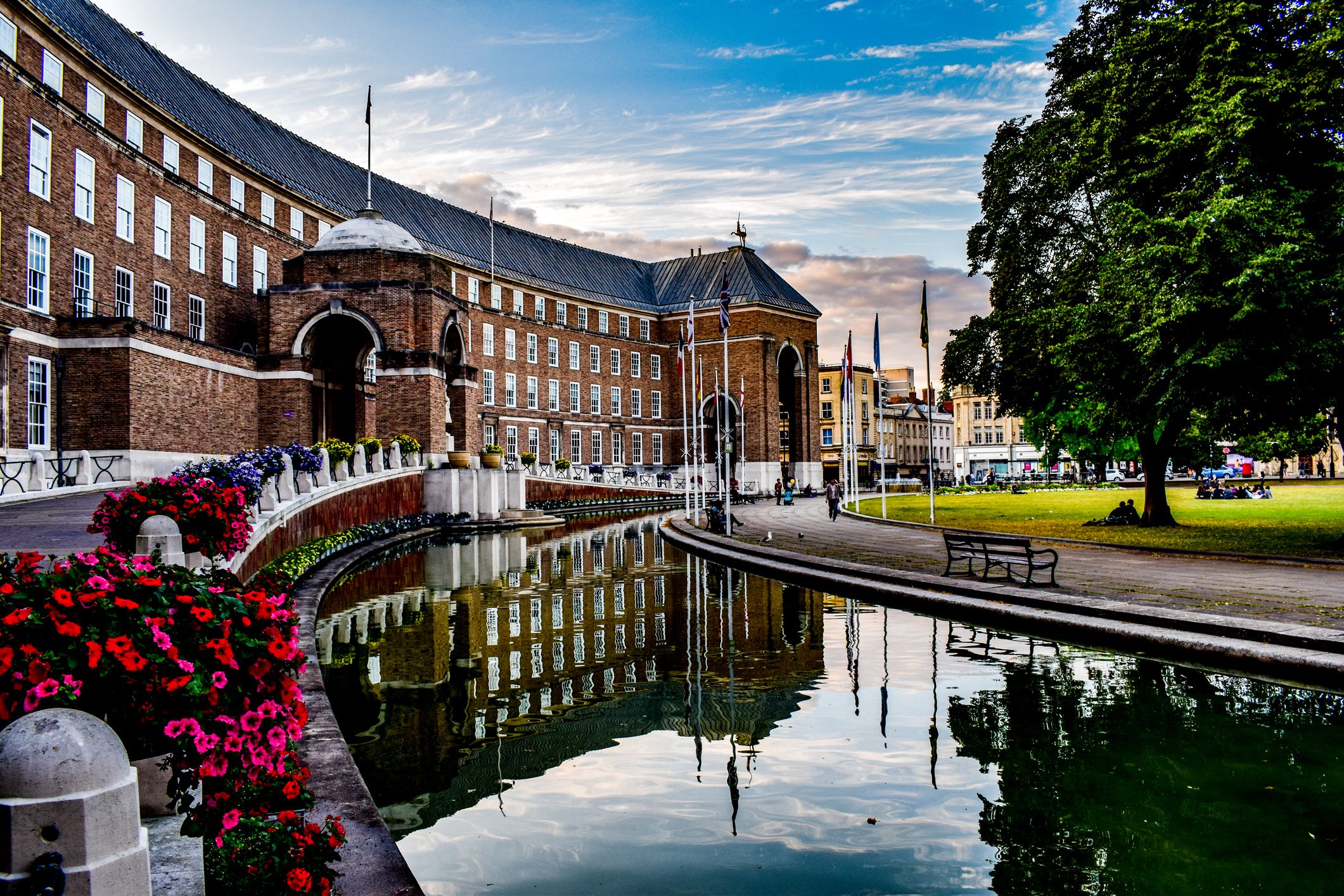
More from MediaFeed
10 bloody brilliant british phrases.
- Think You Know Classic Cars? Name These Makes & Models by Their Taillights
- 22 Incredible (Yet Disturbing) Movies We Won't Dare Watch Again
More for You
America's Abrams Tanks Are Failing the Ukraine Test
Trump campaign accused of breaking federal law by hiding millions in legal payments
Here's No. 1 thing mentally strong couples 'never' do, says relationship therapist of 20 years
28 celebrities you probably did not know are nonbinary
NFL draft grades: Every team's pick in 2024 first round broken down
Spacecraft spots "spiders" scattered across surface of Mars
See inside the eerie, abandoned Air Force base that spawned conspiracy theories and inspired 'Stranger Things'
Zendaya's Baby Pink Tennis Polo Dress Includes Cutouts That Hit Her Hip Bone
Martin Lewis issues warning to people choosing air fryer over oven
Why You Should Think Twice Before Pouring Boiling Water Over Ant Hills In Your Yard
Harvard psychologist shares 5 toxic things 'highly narcissistic' people always do in relationships
Scientists finally confirm what lies inside the Moon
Eagles' A.J. Brown just made signing CeeDee Lamb even harder for the Cowboys
I got my dream job at Apple on my fourth attempt. Here's why I left the 6-figure job after only 2 years.
HMS Diamond has just taught our enemies an important lesson. Don’t underestimate the Royal Navy
The Lord Of The Rings: The War Of The Rohirrim – Release Date, Cast, Plot, And More Info
10 things you need to watch before they leave US Netflix next month
'10-foot-tall people' discovered by archaeologists in Nevada cave
Republicans Given Ultimatum About Trump
If you and your partner use any of these 5 phrases regularly, your relationship is stronger than most

IMAGES
VIDEO
COMMENTS
Travelers and travellers are both English terms. Travelers is predominantly used in 🇺🇸 American (US) English ( en-US) while travellers is predominantly used in 🇬🇧 British English (used in UK/AU/NZ) ( en-GB ). In the United States, there is a preference for " travelers " over "travellers" (93 to 7). In the United Kingdom, there is a ...
Travelers vs. Travellers - the two spellings have coexisted in the English language for centuries, with each spelling being used interchangeably in different regions of the world. However, the spelling "traveller" is more commonly used in British English, while "traveler" is more commonly used in American English.
Traveller is a term used in British English to describe a person who is traveling or has traveled. This term is also used in other English-speaking countries such as Canada, Australia, and New Zealand. The spelling of "traveller" with two L's is the preferred spelling in British English, while the spelling with one L is more common in ...
Traveller is well-known for helping students build their receptive language skills while systematically developing their productive ones. Traveller comes in two editions, the American English (AmE) edition and the British English (BrE) edition. Select the edition you prefer in order to see the levels, the components and table of contents.
Travelling (with two Ls) is the preferred spelling in British English and is used much more frequently than is traveling. The graph below shows the use of travelling vs. traveling (as a percentage of all words used) in British English books, journals, and magazines from 1800 to 2008.
Travelling and traveling are both correct spellings of the present participle and gerund of the verb "travel," which means "go from one place to another." The spelling depends on whether you use British English or American English. In British English, "travelling" with a double "l" is the most common.; In American English, "traveling" with one "l" is standard.
The spelling tends to vary based on whether you're writing UK or US English: In UK English, "travelling" (double "l") is standard. In US English, "traveling" (one "l") is correct. Examples: Travelling and traveling in a sentence. Ava doesn't like travelling/traveling by boat because she gets seasick. If you're travelling ...
Travel is also an amazing reason to improve your English. This was Andrea's goal to help her improve, and she achieved English fluency in 6 months! Want to get some practice speaking English before your vacation? Try a few sessions with a Preply English tutor or discover the Preply business trip English lessons. You can practice all the ...
Gypsy, Roma and Traveller (abbreviated to GRT) is an umbrella term used in the United Kingdom to represent several diverse ethnic groups which have a shared history of nomadism.The groups include Gypsies, defined as communities of travelling people who share a Romani heritage, resident in Britain since the 16th century; Ethnic Travellers, the traditional travelling people of Ireland and ...
Yes, "travellers" actually is written with two "l" in British spelling - in the American however not. And yes, we adapt ourselves to American English: We write "color", "theater" and "cookie" - not "colour", "theatre" and "biscuit". Nevertheless, of course we have thought about that when choosing our name ...
American books and websites use 'traveler,' while British ones use 'traveller.' Both are right in their own way. You will like: Center vs Centre: Decoding the Spelling Difference. Language Changings. Words change over time, and that's cool. 'Traveler' and 'Traveller' show how English can be different but still right.
English Travellers. The term English Travellers refers to itinerant groups, and may mean: Romanichals, a Romani ethnic group also known as English Travellers or English Gypsies. British showmen, commonly referred to as Funfair Travellers. New Age travellers.
When using the verb "travel" in the past tense, the exact spelling applies to British English vs. American English, as with the "-ing" form. British English is written with a double "l" and in American English, both ways are possible but a single "l" is more common. British English: "Travelled" American English: "Traveled ...
A tale of two variants. What to Know. When it comes to spelling the forms of the verb travel, traveled and traveling are more common in the U.S., and travelled and travelling are dominant everywhere else. Spelling is typically clear-cut in modern English: forty unfailingly betrays four; the sweet treat after dinner is spelled dessert, not desert.
Arthur Harding's classic account of the East End underworld at the beginning of the 20th century, compiled by the historian Raphael Samuel, revealed in passing how Gypsy Travellers were part of the everyday fabric of poor urban life. David Mayall's work on the 19th century, my own on the 20th and that of the Dutch scholars Lucassen, Willems ...
helicopter. parachute. airport. hangar. control tower. air traffic controller. runway. Explore the British English vocabulary of Travel in this sound integrated guide. Touch or place your cursor over an object to hear it pronounced aloud.
TRAVELLER definition: 1. someone who travels: 2. a gypsy 3. UK spelling of traveler. Learn more.
Round-the-world travellers. This lesson offers a variety of activities based on British round-the-world travellers; a cyclist, a running granny and a teenage sailor. Students will firstly review country names, and then there is an activity to pre-teach vocabulary for a jigsaw reading task, where students will explain their texts to each other.
Wrapping Up Our English Travel Vocabulary Journey. And there you have it! We've journeyed through 40 essential English words and phrases that will help make your travels smoother and more enjoyable. Remember, language is a powerful tool that can open doors to understanding new cultures, making new friends, and creating unforgettable ...
EnglishScore Tutors is the British Council's one-to-one tutoring platform for 13- to 17-year-olds. Find out more. ... but i want to travel to Greece . Log in or register to post comments; Submitted by Luna on Fri, 08/28/2020 ... Our Secondary Plus English course will teach you the skills to build your confidence and help you reach your full ...
This mostly came in the form of French vocabulary added to the English language, such as avant-garde and à la carte, although the word-sharing went from English to French as well (e.g. week-end).